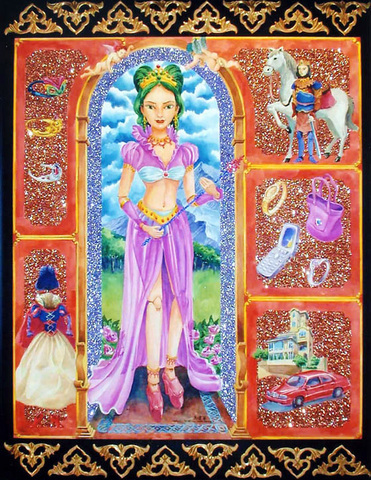Cruising down Feng Nan Street in Kaohsiung, Wu Chiung-hua (吳瓊華) stops her car in front of the Venice Betel Nut stand. She is searching for betel nut beauties to interview. As she chews on a betel nut, Wu, an artist, chats with the owner, who tells her the girl that works the morning shift has the day off.
With her brown wavy shoulder-length hair, sheer purple top, and black high-heeled boots adorned with buckles, Wu can almost pass for a betel nut seller, as she struts around the small glass booth and snaps photos for an ongoing pro-ject featuring betel nut girls.
Access like this has not always been easy for Wu, whose latest exhibit about betel nut girls opened recently at the National Taiwan Arts Education Institute.

PHOTO COURTESY OF ARTIST
She has spent the last 10 years researching betel nut culture, interviewing betel nut beauties, and photographing the girls in action. Wu has faced frightened girls and hostile owners wary of her research. Once, an irate owner confiscated her film and chased her away from his stand.
"There was a time when I thought about stopping this topic," Wu said. Her desire to help the girls through art, kept her going. "The real me is connected to the issue of betel nut girls. Through this research I have become young again. I've rediscovered my youth. I've been liberated."
Until Sept. 13, the public can view for free the numerous screen prints, photos, and artifacts
depicting Taiwan's betel nut
culture at the exhibit entitled Taiwan's Betel Nut, Wu Chung-hua Betel Nut Show Girls Compound, Decorative Arts Exhibition.
The sexually-charged exhibit purposely clashes with the museum's conservative scholarly neighbors. Jianguo High School is across the street. The school's statue of Chiang Kai-shek stares directly at the museum's former guard house, which has tempora-rily been transformed into a betel nut stand complete with pink neon lights. Inside the walls are adorned with dozens of color photos of breasts in all shapes and sizes. "Putting this exhibition in a traditional area like this is like throwing a rock into a pond. When you throw a rock into a pond, it makes ripples," Wu said.
"When Taiwan was a poor country, we could only look at Barbie dolls in store windows. They were something we wanted but we couldn't have," Wu said, referring to the first panel, which features a doll in a purple bikini. "This is similar to the way men look at the betel nut beauties inside their glass boxes."
Some people who have seen the exhibit have found parts of it unsettling. "I think there are some pictures that are not appropriate but she [Wu] has done her work with good intentions," said Chang Chun-Chieh (張俊傑), the former director-general of the National Arts Education Instititute.
National Taiwan Arts Education Institute (國立台灣藝術教育館), 47, Nanhai Rd, Taipei (台北市南海路47號). Open Monday to Sunday from 9am to 5pm. Call (02) 2311 0574.

Late last month Philippines Foreign Affairs Secretary Theresa Lazaro told the Philippine Senate that the nation has sufficient funds to evacuate the nearly 170,000 Filipino residents in Taiwan, 84 percent of whom are migrant workers, in the event of war. Agencies have been exploring evacuation scenarios since early this year, she said. She also observed that since the Philippines has only limited ships, the government is consulting security agencies for alternatives. Filipinos are a distant third in overall migrant worker population. Indonesia has over 248,000 workers, followed by roughly 240,000 Vietnamese. It should be noted that there are another 170,000

Enter the Dragon 13 will bring Taiwan’s first taste of Dirty Boxing Sunday at Taipei Gymnasium, one highlight of a mixed-rules card blending new formats with traditional MMA. The undercard starts at 10:30am, with the main card beginning at 4pm. Tickets are NT$1,200. Dirty Boxing is a US-born ruleset popularized by fighters Mike Perry and Jon Jones as an alternative to boxing. The format has gained traction overseas, with its inaugural championship streamed free to millions on YouTube, Facebook and Instagram. Taiwan’s version allows punches and elbows with clinch striking, but bans kicks, knees and takedowns. The rules are stricter than the

“Far from being a rock or island … it turns out that the best metaphor to describe the human body is ‘sponge.’ We’re permeable,” write Rick Smith and Bruce Lourie in their book Slow Death By Rubber Duck: The Secret Danger of Everyday Things. While the permeability of our cells is key to being alive, it also means we absorb more potentially harmful substances than we realize. Studies have found a number of chemical residues in human breast milk, urine and water systems. Many of them are endocrine disruptors, which can interfere with the body’s natural hormones. “They can mimic, block

Pratas Island, or Dongsha (東沙群島) had lain off the southern coast of China for thousands of years with no one claiming it until 1908, when a Japanese merchant set up a facility there to harvest guano. The Americans, then overlords of the Philippines, disturbed to learn of Japanese expansion so close to their colony, alerted the Manchu (Qing) government. That same year the British government asked the Manchus who owned the island, which prompted the Manchu government to make a claim, according to South China Sea expert Bill Hayton. In 1909 the government of Guangdong finally got around to sending